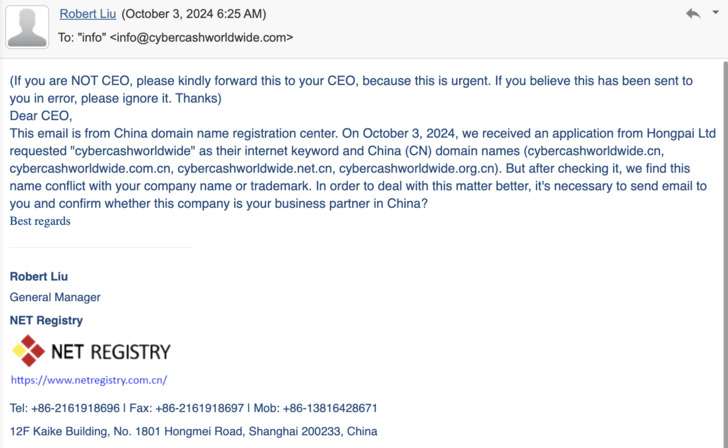The China Domain Name Registration Scam, also known as the ".cn domain scam," is a common phishing attempt that targets website owners and businesses around the world. The scam typically involves an email from a Chinese domain registration company claiming that someone is trying to register a domain name similar to your own, but with a Chinese domain extension, like .cn. These emails create a false sense of urgency and pressure you to act quickly by purchasing the domain name or responding to the message.
This is what we have received;
Dear CEO,
This email is from China domain name registration center. On October 3, 2024, we received an application from Hongpai Ltd requested "cybercashworldwide" as their internet keyword and China (CN) domain names (cybercashworldwide.cn, cybercashworldwide.com.cn, cybercashworldwide.net.cn, cybercashworldwide.org.cn). But after checking it, we find this name conflict with your company name or trademark. In order to deal with this matter better, it's necessary to send email to you and confirm whether this company is your business partner in China?
Best regards
Robert Liu
General Manager
NET Registry
How the Scam Works
The Email: You receive an email from what appears to be a Chinese domain registrar. The message usually claims that a third party is attempting to register domain names that are identical or very similar to your own, but with Chinese domain extensions such as .cn, .com.cn, or .net.cn. The email will suggest that this is a potential conflict and that you have the first right to register the domain to protect your brand.
Urgency and Pressure: The scammer will imply that if you do not act quickly, the other party will successfully register the domain, potentially harming your brand's reputation in China. They might offer you the opportunity to buy the domain yourself, often for a much higher price than it would typically cost.
Call to Action: The email will often include a call to reply directly to the message, engage in a domain purchase, or click a link to resolve the conflict. This is where the scam truly unfolds.

What Happens if You Reply?
- Engagement with the Scammer: If you reply to the email, the scammer will usually try to convince you that the threat is real. They will make further offers for you to "secure" the domain by purchasing it through them. In reality, there’s no third party trying to register your domain; it’s all fabricated to scare you into buying domains you don’t need.
- High-Priced Offers: The scammer will then offer to sell you the Chinese domain at an inflated price. Domain names are relatively cheap, but they might ask for hundreds or even thousands of dollars for the “rights” to these domains.
- More Scams or Spam: By replying, you confirm that your email is valid and that you’re okay to engage with them. You'll risk receiving more phishing emails, spam, or further attempts to extract money from you. In some cases, they could try to escalate the scam to ask for personal or financial information, exposing you to more risks.
- No Real Resolution: Even if you pay them, you are not getting any legitimate service. In most cases, the domain is not actually registered in your name, or the registration is unnecessary and overcharged.
What Do Other Bloggers Say?
Bloggers, tech professionals, and domain experts frequently share their experiences with this scam, warning others to ignore these emails and highlighting how widespread the scam has become.
- No Legitimate Threat: Bloggers who have received these emails point out that there is no third-party buyer trying to register your domain with a .cn extension. They emphasize that these emails are scare tactics designed to pressure website owners into making unnecessary domain purchases.
- Generic and Mass-Targeted: Many bloggers note that the emails are often mass-produced and follow a very generic script. The scammers do not actually have detailed knowledge of your domain or business. They use the same tactic with thousands of domain owners, hoping a few will fall for the trick.
- Costly Trap: Some bloggers have shared stories of people who, unfortunately, responded to the email and ended up paying large sums of money for a domain they didn’t need or that didn’t belong to them. They warn others to avoid making the same mistake.
- Best Advice: Ignore: Across the board, the best advice given is to simply ignore these emails. Legitimate domain registration processes don’t work this way, and a real domain conflict would come through more official channels. Reputable domain registrars do not send unsolicited emails like this to pressure owners into purchasing domains.
Do Nothing
If you receive an email from a Chinese domain registration company or any email claiming domain conflicts with a .cn extension, it’s almost certainly a scam. Ignoring the message is the safest move. Responding or engaging with the scammer can open you up to more risks, such as inflated domain prices, more phishing attempts, or exposure of your personal information. Bloggers and domain experts consistently recommend marking these emails as spam and moving on without giving them a second thought.
Did You Know You Already Have A LOT To Sell?
So What's Your Problem?

